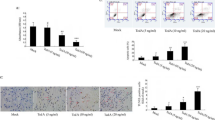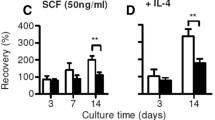Abstract
Toxin A (TcdA) and toxin B (TcdB) are the major virulence factors of Clostridium difficile and are the causative agents for clinical symptoms, such as secretory diarrhoea and pseudomembranous colitis. Mast cells are essentially involved in the toxin-induced colonic inflammatory processes. To study the direct effects of these toxins on the expression of inflammatory genes, a DNA microarray containing evaluated probes of 90 selected inflammatory genes was applied to the immature mast cell line HMC-1. TcdA and TcdB induced up-regulation of only a limited number of genes within the early phase of cell treatment. Interleukin-8 (IL-8), transcription factor c-jun and heme oxygenase-1 messenger RNA (mRNA) increased more than 2-fold. In contrast, IL-16, known as a CD4+ T-cell chemoattractant factor and the chemokine receptor cKit were down-regulated. Stimulation of HMC-1 cells with IL-8 had no effect on IL-16 mRNA level, indicating that both cytokines were independently affected by the toxins. Regulation of both cytokines, however, depended on glucosylation of Rho GTPases as tested by application of enzyme-deficient TcdA or TcdB. Down-regulation of total and secreted IL-16 protein was checked by enzyme-linked immunosorbent assay. The data implicate that TcdA and TcdB affect lymphocyte migration by modulating release of the chemoattractant factor IL-16 from mast cells. In addition, this is the first report showing that Rho GTPases are involved in the regulation of IL-16 expression.




Similar content being viewed by others
References
Abraham SN, Malaviya R (1997) Mast cells in infection and immunity. Infect Immun 65:3501–3508
Bischoff SC, Kramer S (2007) Human mast cells, bacteria, and intestinal immunity. Immunol Rev 217:329–337
Burger S, Tatge H, Hofmann F, Just I, Gerhard R (2003) Expression of recombinant Clostridium difficile toxin A using the Bacillus megaterium system. Biochem Biophys Res Commun 307:584–588
Butterfield JH, Weiler D, Dewald G, Gleich GJ (1988) Establishment of an immature mast cell line from a patient with mast cell leukemia. Leuk Res 12:345–355
Calderón GM, Torres-López J, Lin T-J, Chavez B, Hernández M, Munoz O, Befus AD, Enciso JA (1998) Effects of toxin A from Clostridium difficile on mast cell activation and survival. Infect Immun 66:2755–2761
Cheon IS, Woo SS, Kang SS, Im J, Yun CH, Chung DK, Park DK, Han SH (2008) Peptidoglycan-mediated IL-8 expression in human alveolar type II epithelial cells requires lipid raft formation and MAPK activation. Mol Immunol 45:1665–1673
Coussens PM, Verman N, Coussens MA, Elftman MD, McNulty AM (2004) Cytokine gene expression in peripheral blood mononuclear cells and tissues of cattle infected with Mycobacterium avium subsp. paratuberculosis: evidence for an inherent proinflammatory gene expression pattern. Infect Immun 72:1409–1422
Genth H, Huelsenbeck J, Hartmann B, Hofmann F, Just I, Gerhard R (2006) Cellular stability of Rho-GTPases glucosylated by Clostridium difficile toxin B. FEBS Lett 580:3565–3569
Gerhard R, Tatge H, Genth H, Thum T, Borlak J, Fritz G, Just I (2005) Clostridium difficile toxin A induces expression of the stress-induced early gene product RhoB. J Biol Chem 280:1499–1505
Glass WG, Sarisky RT, Vecchio AM (2006) Not-so-sweet sixteen: the role of IL-16 in infectious and immune-mediated inflammatory diseases. J Interferon Cytokine Res 26:511–520
Just I, Gerhard R (2004) Large clostridial cytotoxins. Rev Physiol Biochem Pharmacol 152:23–47
Keates AC, Castagliuolo I, Cruickshank WW, Qiu B, Arseneau KO, Brazer W, Kelly CP (2000) Interleukin 16 is up-regulated in Crohn’s disease and participates in TNBS colitis in mice. Gastroenterology 119:972–982
Meyer GK, Neetz A, Brandes G, Tsikas D, Butterfield JH, Just I, Gerhard R (2007) Clostridium difficile toxins A and B directly stimulate human mast cells. Infect Immun 75:3868–3876
Ng J, Hirota SA, Gross O, Li Y, Ulke-Lemee A, Potentier MS, Schenck LP, Vilaysane A, Seamone ME, Feng H, Armstrong GD, Tschopp J, Macdonald JA, Muruve DA, Beck PL (2010) Clostridium difficile toxin-induced inflammation and intestinal injury are mediated by the inflammasome. Gastroenterology 139(542–52):552
Nottrott S, Schoentaube J, Genth H, Just I, Gerhard R (2007) Clostridium difficile toxin A-induced apoptosis is p53-independent but depends on glucosylation of Rho GTPases. Apoptosis 12:1443–1453
Pothoulakis C, Castagliuolo I, LaMont JT (1998) Nerves and intestinal mast cells modulate responses to enterotoxins. News Physiol Sci 13:58–63
Pothoulakis C, Karmeli F, Kelly CP, Eliakim R, Joshi MA, O’Keane CJ, Castagliuolo I, LaMont JT, Rachmilewitz D (1993) Ketotifen inhibits Clostridium difficile toxin A-induced enteritis in rat ileum. Gastroenterology 105:701–707
Qi JC, Wang J, Mandadi S, Tanaka K, Roufogalis BD, Madigan MC, Lai K, Yan F, Chong BH, Stevens RL, Krilis SA (2006) Human and mouse mast cells use the tetraspanin CD9 as an alternate interleukin-16 receptor. Blood 107:135–142
Rocha MFG, Maia MET, Bezerra LRPS, Lyerly DM, Guerrant RL, Ribeiro RA, Lima AAM (1997) Clostridium difficile toxin A induces the release of neutrophil chemotactic factors from rat peritoneal macrophages: role of interleukin1β, tumor necrosis factor alpha, and leukotrienes. Infect Immun 65:2740–2746
Russell DA (1986) Mast cells in the regulation of intestinal electrolyte transport. Am J Physiol 251:G253–G262
Sciaky D, Brazer W, Center DM, Cruikshank WW, Smith TJ (2000) Cultured human fibroblasts express constitutive IL-16 mRNA: cytokine induction of active IL-16 protein synthesis through a caspase-3-dependent mechanism. J Immunol 164:3806–3814
Seegert D, Rosenstiel P, Pfahler H, Pfefferkorn P, Nikolaus S, Schreiber S (2001) Increased expression of IL-16 in inflammatory bowel disease. Gut 48:326–332
Stein J, Ries J, Barrett KE (1998) Disruption of intestinal barrier function associated with experimental colitis: possible role of mast cells. Am J Physiol 274:G203–G209
Sun X, Savidge T, Feng H (2010) The enterotoxicity of Clostridium difficile toxins. Toxins 2:1848–1880
Teichert M, Tatge H, Schoentaube J, Just I, Gerhard R (2006) Application of mutated Clostridium difficile toxin A for determination of glucosyltransferase-dependent effects. Infect Immun 74:6006–6010
Warny M, Keates AC, Keates S, Castagliuolo I, Zacks JK, Aboudola S, Qamar A, Pothoulakis C, LaMont JT, Kelly CP (2000) p38MAP kinase activation by Clostridum difficile toxin A mediates monocytes necrosis, IL-8 production, and enteritis. J Clin Investig 105:1147–1156
Wershil BK, Castagliuolo I, Pothoulakis C (1998) Direct evidence of mast cell involvement in Clostridium difficile toxin A-induced enteritis in mice. Gastroenterology 114:956–964
Yang G, Zhou B, Wang J, He X, Sun X, Nie W, Tzipori S, Feng H (2008) Expression of recombinant Clostridium difficile toxin A and B in Bacillus megaterium. BMC Microbiol 8:192
Zhang Y, Center DM, Wu DM, Cruikshank WW, Yuan J, Andrews DW, Kornfeld H (1998) Processing and activation of pro-interleukin-16 by caspase-3. J Biol Chem 273:1144–1149
Acknowledgements
This study was funded by the Deutsche Forschungsgemeinschaft (SFB621, project B5).
Author information
Authors and Affiliations
Corresponding author
Rights and permissions
About this article
Cite this article
Gerhard, R., Queißer, S., Tatge, H. et al. Down-regulation of interleukin-16 in human mast cells HMC-1 by Clostridium difficile toxins A and B. Naunyn-Schmied Arch Pharmacol 383, 285–295 (2011). https://doi.org/10.1007/s00210-010-0592-8
Received:
Accepted:
Published:
Issue Date:
DOI: https://doi.org/10.1007/s00210-010-0592-8




